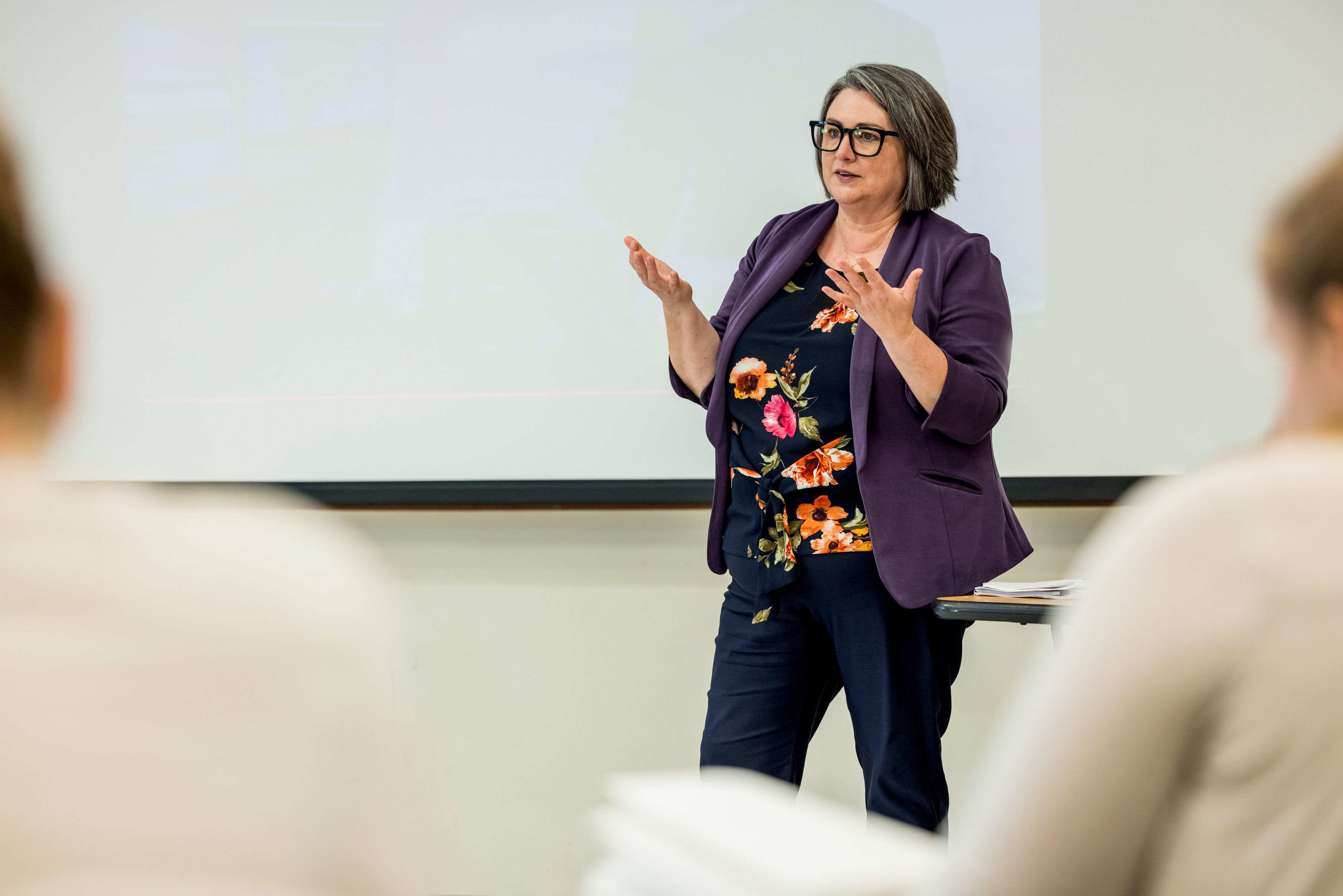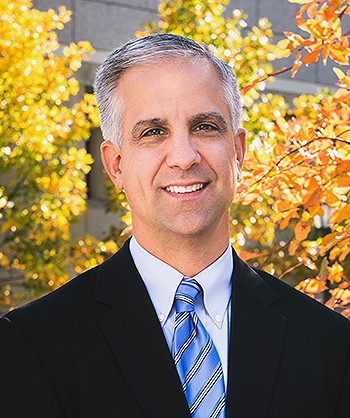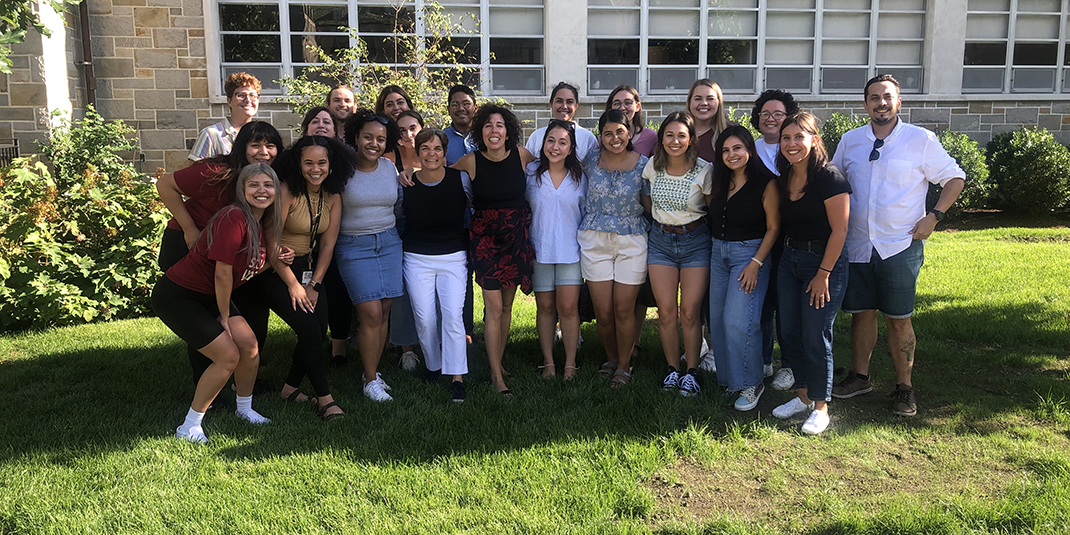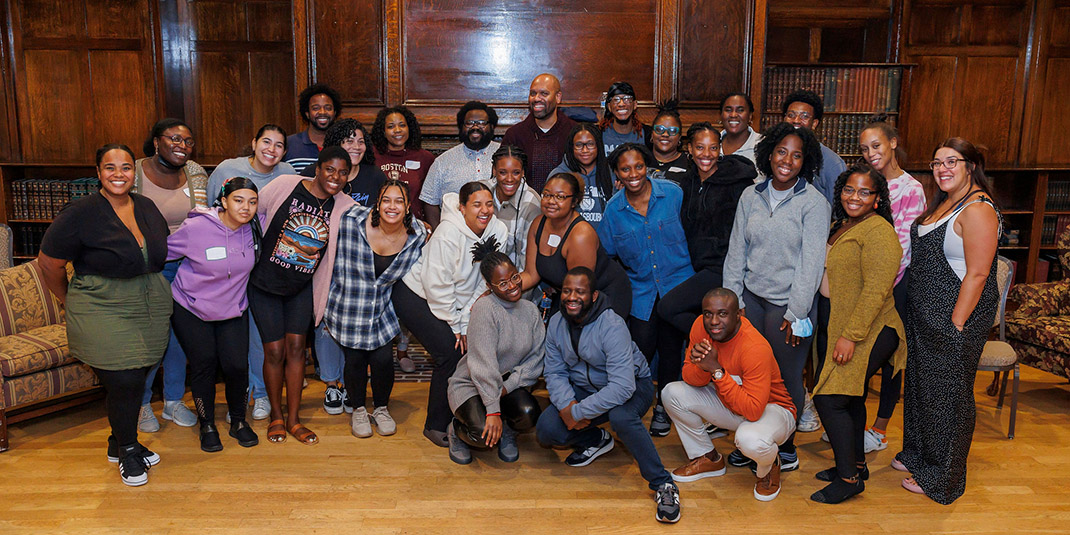
Kathleen Flinton, an assistant professor of practice who co-chairs the Trauma Integration Initiative, teaches a class of MSW students. Photo by Caitlin Cunningham, BC Photography.
As the number of Americans seeking treatment for mental health issues continues to rise, the Boston College School of Social Work is preparing students to improve the well-being of individuals, families, and communities.
BCSSW’s Trauma-Informed Mental Health field of practice—one of the school’s six academic pathways that include specialized coursework and field placements—trains future practitioners to deliver evidence-based interventions, design policies for vulnerable populations, champion those in need, and more.
Clinical students develop strong assessment skills and learn how to integrate evidence-based interventions into their work with clients in behavioral health settings. Macro students develop policy, planning, and management skills to become effective advocates at the local, state, and national levels.
We asked Scott Easton, an associate professor who chairs the Trauma-Informed Mental Health field of practice, to give prospective students a rundown of the program.
A few years ago, BCSSW launched the Trauma Integration Initiative, a holistic program that prepares students to help clients cope with trauma while guarding themselves against its effects. How will students who choose this field of practice benefit from the School’s trauma-informed approach to social work?
The mental health field of practice was the initial curricular home for TII initiatives, which is natural because trauma is inextricably linked with emotional and behavioral health. Classes are built on cutting-edge empirical and theoretical approaches to trauma, including neurobiological and ecological frameworks. They are taught by experienced practitioners who bring trauma theories and treatment modalities to life. Beyond the classroom, students benefit from the trauma-focused lens used in field placement matching, advising, and supervision.
Students can also take advantage of learning opportunities and events sponsored by TII, including speakers on topics that intersect with mental health, such as racial trauma or interpersonal violence. Finally, students learn from each other in practicing self-care techniques via trauma learning communities.
Clinical students who choose this field of practice are required to take Adult Psychological Trauma. Macro students who choose this field of practice are required to take Planning for Health and Mental Health Services. What are three skills that students will learn from each of these courses?
After completing Adult Psychological Trauma, students will have specialized knowledge and skills to effectively work in various settings with clients who have trauma histories. Combined with other courses in our program, students will be able to conduct trauma-informed assessments leading to diagnosis, as well as treat clients with evidenced-based trauma interventions for individuals, couples, families, and groups. Modalities range from affect regulation or sensorimotor psychotherapy to spirituality and meaning-making.
A second outcome is that students will see trauma differently, realizing that it is not only the result of a distressing, harmful experience such as child sexual abuse, but also occurs through broader systemic or environmental stressors such as racism or community violence.
A third skill may be the most important in sustaining viable, productive, and impactful careers: Students learn to recognize and prevent vicarious trauma, so that they will be equipped to promote their own health while helping others heal.
Students who take Planning for Health and Mental Health Services are introduced to key healthcare systems in the United States and develop actionable skills to design, implement, operate, and analyze programs and systems. This includes conducting needs assessments to identify pressing issues and critically analyze existing services and supports; conceptualizing and designing solutions using evidence-based, trauma-informed strategies; setting program goals and objectives; implementing and managing programs (e.g., budgeting, staffing); and collecting data for ongoing program refinement and outcomes measurement. Students also practice those skills and explore implications for addressing complex issues, often involving trauma, that they encounter in the field.

Scott Easton, an associate professor, chairs the Trauma-Informed Mental Health field of practice.
Faculty in the Trauma-Informed Mental Health program include scholars, clinicians, scientists, and leaders from a variety of industries—all dedicated to improving the lives of the most vulnerable. How many different faculty teach courses in this field of practice, and what are some of their specific areas of expertise?
The faculty in the mental health department are outstanding and our biggest asset. We have more than 60 faculty who teach in this field of practice, the largest number of any department at BCSSW. There are 15 full-time faculty, most of whom also are conducting exciting research on mental health topics and populations.
Some examples include suicide risk and protection for Latinx and minoritized youth; healing, resiliency, and post-traumatic growth for adult survivors of child sexual abuse; evidence-based mental health interventions for migrant families from Colombia; HIV prevention among African-American mothers through implementation science; and econometric techniques to evaluate impacts of tobacco or nutrition policies. They bring this cutting edge knowledge into the classroom for students’ benefit.
Then we have three full-time professors of the practice who bring decades of clinical and macro practice experience to students. Their expertise includes topics such as internal family systems therapy, eye movement desensitization and reprocessing, cross-cultural trauma treatment, and design and futures thinking. Finally, we have numerous part-time faculty who are highly respected practitioners in the greater Boston area and bring a wealth of real-world mental health knowledge to their dynamic classrooms.
MSW students at BCSSW gain real-world experience through field practicums with organizations that complement their goals and interests. Where are students specializing in trauma-informed mental health working now?
We have an outstanding Field Education team that has relationships with more than 600 organizations and agencies throughout the Boston area and Commonwealth of Massachusetts. Our students train in settings ranging from outpatient counseling centers to schools to hospitals to prisons. Recently our students have been placed at leading organizations such as McLean Hospital, Riverside Community Care, South End Community Health Care, North Suffolk Mental Health Association, Boston Public Schools, Massachusetts General Hospital, Veterans Administration Hospitals, and more.
More than half of BCSSW graduates work in mental health settings. Where do they typically land after they earn their degree?
Our graduates are well-prepared to work in a variety of settings that often require trauma-informed skills. Settings include hospital-based services (inpatient psychiatry, emergency room/crisis), community-based, in-home casework, forensic agencies, homeless service providers, outpatient clinics, substance abuse programs, school districts, state agencies, and grassroots organizations. With Massachusetts leading the way in national healthcare reform, students are exposed to—and trained for successful careers in—the rapidly changing world of behavioral health.
Easton received input from Kathleen Flinton, an assistant professor of practice who co-chairs the TII; Thomas Walsh, director of the MSW program; Susan Coleman, assistant dean of field education and co-chair of the TII; Kenna Sullivan, assistant director of field education; Cindy Snell, director of Career Services and Alumni Relations; and Matt Pecoraro, a part-time faculty member who teaches Planning for Health and Mental Health Services.




